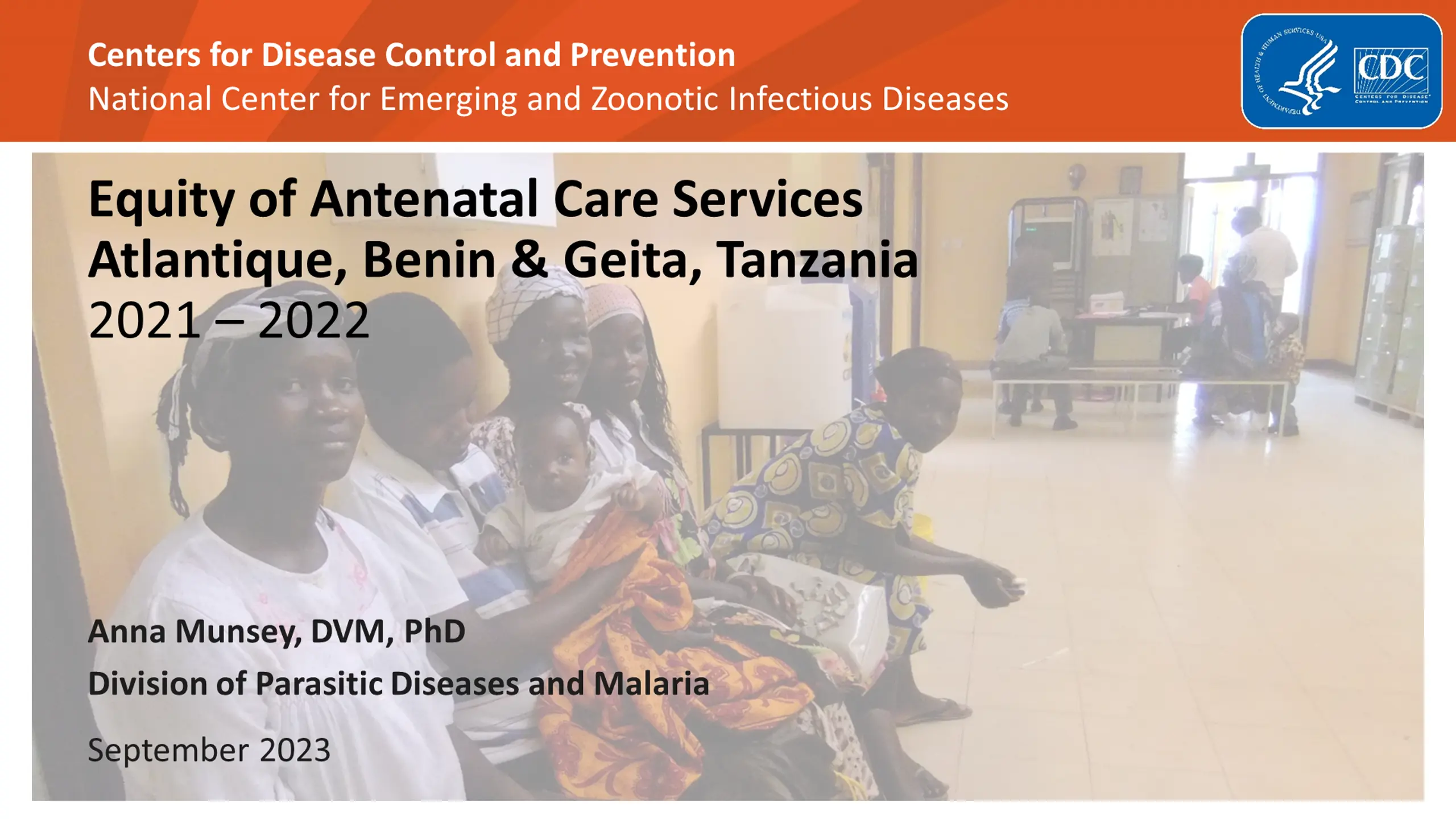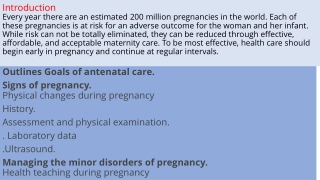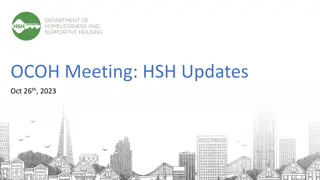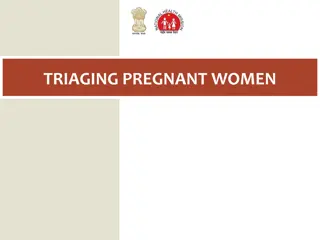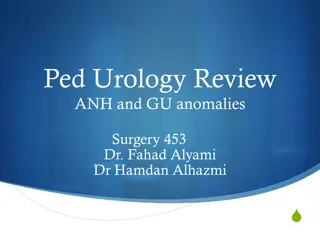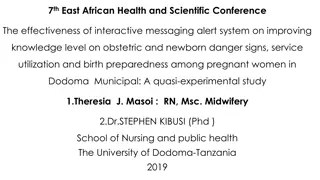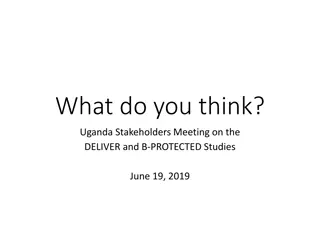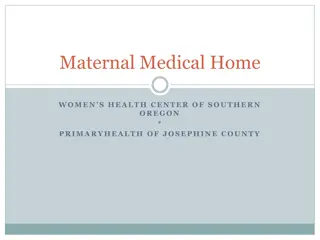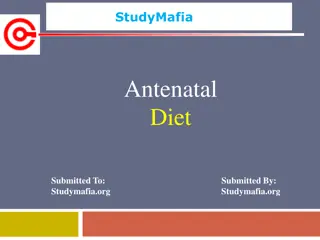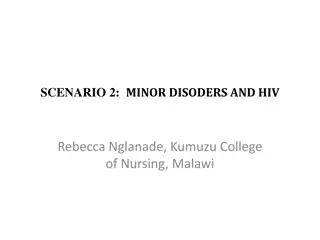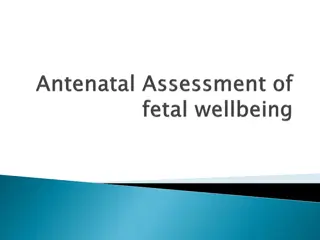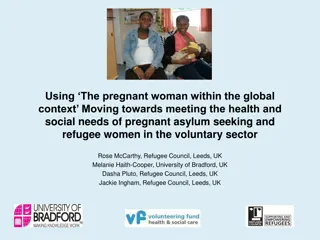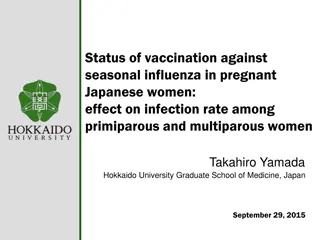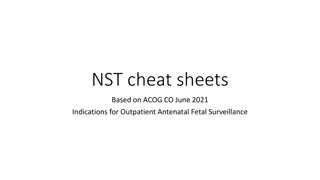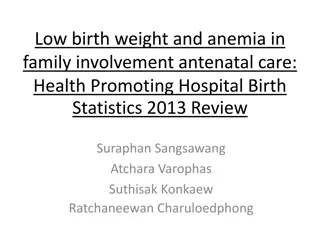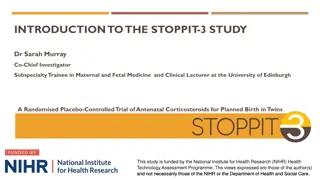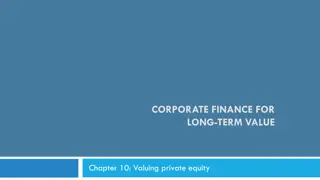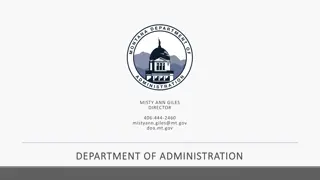Enhancing Antenatal Care Equity for Pregnant Women
Analyzing antenatal care services from a health equity perspective, this study explores how factors like location, socio-cultural norms, education, and wealth impact care quality and availability for pregnant women in Benin and Tanzania. By assessing government financing for ANC services through cross-sectional surveys and various analytical methods, disparities in ANC attendance and outcomes based on wealth and education levels are identified, highlighting the need for policy changes to ensure equitable access and quality care.
Download Presentation

Please find below an Image/Link to download the presentation.
The content on the website is provided AS IS for your information and personal use only. It may not be sold, licensed, or shared on other websites without obtaining consent from the author.If you encounter any issues during the download, it is possible that the publisher has removed the file from their server.
You are allowed to download the files provided on this website for personal or commercial use, subject to the condition that they are used lawfully. All files are the property of their respective owners.
The content on the website is provided AS IS for your information and personal use only. It may not be sold, licensed, or shared on other websites without obtaining consent from the author.
E N D
Presentation Transcript
Centers for Disease Control and Prevention National Center for Emerging and Zoonotic Infectious Diseases Equity of Antenatal Care Services Atlantique, Benin & Geita, Tanzania 2021 2022 Anna Munsey, DVM, PhD Division of Parasitic Diseases and Malaria September 2023
ANC through a health equity lens Horizontal equity: pregnant women have similar needs regarding minimum quality of care Availability and quality of care affected by location sociocultural norms education wealth, cost
ANC through a health equity lens Equity analyses allow identification of disparities amenable to policy change over different time horizons.
Two ANC Financing Structures Atlantique, Benin: ANC attendees pay a fee for each visit Geita, Tanzania: most ANC services are free for attendees
Study Design & Methods Is government financing for ANC services equitable? Cross-sectional surveys of recently pregnant women Assessed ANC outcomes by wealth and education levels slope and relative indices of inequality; concentration indices Oaxaca-Blinder decompositions (multivariable regressions)
ANC Outcomes Total ANC visits Quality-of-care indicators blood pressure urinalysis blood tests System navigation waiting time distance to facility travel time
Results ANC attendance Women do not reach the recommended number of visits in either area Wealthiest, most educated women had 2 more visits than the poorest, least educated Predicted ANC visits by education and wealth - Tanzania Predicted ANC visits by education and wealth - Benin 6 6 Predicted ANC visits Predicted ANC visits 5 5 4 4 3 3 None Primary Secondary Higher None Primary Secondary Higher Educational attainment Educational attainment Quintile 1 Quintile 2 Quintile 3 Quintile 4 Quintile 5 Quintile 1 Quintile 2 Quintile 3 Quintile 4 Quintile 5
Results ANC attendance Education is the most important factor in ANC attendance Contribution to differences in ANC visit coefficients Benin Contribution to differences in ANC visit coefficients Tanzania 2 1.5 Contribution to gap in ANC visits Contribution to gap in ANC visits 1 Age Education HH Members Under-5 Spousal support Married Waiting time Distance Constant Age Education HH Members Under-5 Spousal support Married Waiting time Distance Constant 1 .5 0 0 -.5 -1 -1 Cotton Mean Neumark Reimers Cotton Mean Neumark Reimers Adapted from O'Donnell et al, 2007 Adapted from O'Donnell et al, 2007
Results quality of care Gaps in quality of ANC quality of care services identified in both areas Atlantique: quality indicators are higher and do not vary by SES Geita: quality indicators are lower and vary by SES, with facility factors contributing to inequalities Atlantique, Benin Geita, Tanzania Relative index of inequality: blood pressure 1.0 (SD = .01) 1.2 (SD = .07) * *indicates statistical significance
Results system navigation Operational inequalities wealthier, more educated ANC attendees have shorter waiting times Atlantique, Benin Geita, Tanzania Relative index of inequality: waiting time .86 (SD = .07) * .73 (SD = .07) * *indicates statistical significance
Results out-of-pocket expenditures ANC OOP as % of simulated annual household income Poorer women have higher burden of ANC cost relative to income 3% OOP as proportion of HH income 2% Atlantique: user fees are the primary expense Benin Tanzania Geita: transportation is the primary expense 1% 0% Quintile 1 The ANC costs include delivery costs that are assumed to be spread out across the year Quintile 2 Quintile 3 Quintile 4 Quintile 5
Conclusions Inequities are present in both financing systems Atlantique: reduction of user fees could reduce inequalities Geita: training and equipping healthcare staff could improve quality of care
Acknowledgements CDC USAID Walter Ochieng Julie Gutman Erik Reaves Ahmed Saadani Hassani Chonge Kitojo Tanzania MOH Sijenunu Aron Samwel L Nhiga Frank Chacky IMPACT MALARIA Julie Niemczura Julie Buekens Faustin Onikpo Alexandre Binazon Marie Adeyemi Idohou Manzidatou Alao Jhpiego Alen Kinyina Melkior Assenga Mary Drake Katherine Wolf Stephanie Suhowatsky Ruth Lemwayi Universit d Abomey Calavi Aurore Ogouy mi-Hounto
yck4@cdc.gov For more information, contact CDC 1-800-CDC-INFO (232-4636) TTY: 1-888-232-6348 www.cdc.gov The findings and conclusions in this report are those of the authors and do not necessarily represent the official position of the Centers for Disease Control and Prevention.
